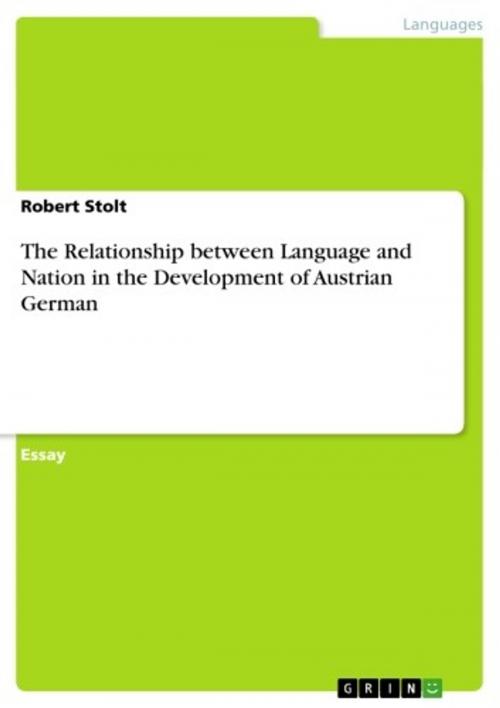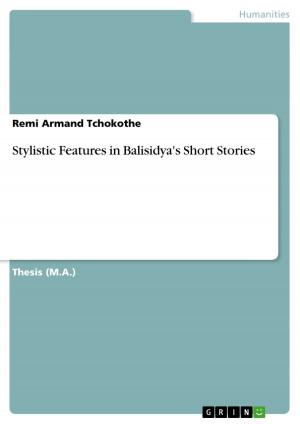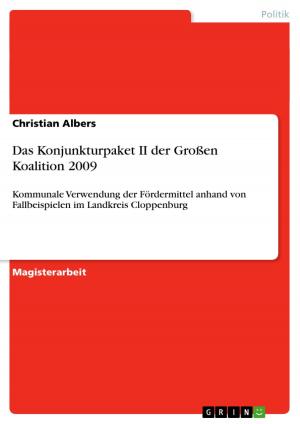The Relationship between Language and Nation in the Development of Austrian German
Nonfiction, Reference & Language, Language Arts, Linguistics| Author: | Robert Stolt | ISBN: | 9783640565733 |
| Publisher: | GRIN Publishing | Publication: | March 16, 2010 |
| Imprint: | GRIN Publishing | Language: | English |
| Author: | Robert Stolt |
| ISBN: | 9783640565733 |
| Publisher: | GRIN Publishing |
| Publication: | March 16, 2010 |
| Imprint: | GRIN Publishing |
| Language: | English |
Essay from the year 2009 in the subject Speech Science / Linguistics, grade: 1,0, University of St Andrews, course: Language and Nation in Europe, language: English, abstract: In the broadest sense, language is a means of identification and self-identification of individuals and social systems (Bodi 1995: 17). In German-speaking countries this can be a controversial issue. Terminologically, the existence of a nation-state called Germany (in German Deutschland = German country) makes it difficult for other German-speaking societies to determine their own national and linguistic idiosyncrasy (Bodi 1995: 19). Through the use of Austrian German language participants not only identify as Austrians, but the common language and history also necessitates identification with other members of the entire German language community. To understand this complexity, the development of Austrian German as a standard variety of the German language is necessary. In the course of this essay it will become clear that historical transitions and political aspects of nation-building are essential constituents of language development or -as Clyne points out- the development of Austrian German norms 'is reflected in a pendulum swing between language planning for national identity and an acceptance of standardized German norms' (Clyne 1992: 121). Therefore, theoretical, language-political and social-historical aspects of the development and current situation of Austrian German shall be investigated. The complex situation that revolves around the German language demands the exploration of the concept of German as a pluricentric language, which will be dealt with in the second chapter. The third chapter is dedicated to the development of the Austrian standard variety with emphasise on social and political history. A special emphasis is placed on the concept of nation-building and the associated national language. Furthermore, in chapter four the development of Austrian German norms shall be considered in the light of Haugen's process of standardisation. A part of this chapter is also dedicated to exploring the diglossic situation in Austria. Lastly, the essay also deals with the current situation of Austrian German and gives an example of how its general prestige can be raised. Finally, in a retrospective analysis of the paper, the research findings will be analysed and an outlook of the future development of Austrian German will be given in the concluding chapter six.
Essay from the year 2009 in the subject Speech Science / Linguistics, grade: 1,0, University of St Andrews, course: Language and Nation in Europe, language: English, abstract: In the broadest sense, language is a means of identification and self-identification of individuals and social systems (Bodi 1995: 17). In German-speaking countries this can be a controversial issue. Terminologically, the existence of a nation-state called Germany (in German Deutschland = German country) makes it difficult for other German-speaking societies to determine their own national and linguistic idiosyncrasy (Bodi 1995: 19). Through the use of Austrian German language participants not only identify as Austrians, but the common language and history also necessitates identification with other members of the entire German language community. To understand this complexity, the development of Austrian German as a standard variety of the German language is necessary. In the course of this essay it will become clear that historical transitions and political aspects of nation-building are essential constituents of language development or -as Clyne points out- the development of Austrian German norms 'is reflected in a pendulum swing between language planning for national identity and an acceptance of standardized German norms' (Clyne 1992: 121). Therefore, theoretical, language-political and social-historical aspects of the development and current situation of Austrian German shall be investigated. The complex situation that revolves around the German language demands the exploration of the concept of German as a pluricentric language, which will be dealt with in the second chapter. The third chapter is dedicated to the development of the Austrian standard variety with emphasise on social and political history. A special emphasis is placed on the concept of nation-building and the associated national language. Furthermore, in chapter four the development of Austrian German norms shall be considered in the light of Haugen's process of standardisation. A part of this chapter is also dedicated to exploring the diglossic situation in Austria. Lastly, the essay also deals with the current situation of Austrian German and gives an example of how its general prestige can be raised. Finally, in a retrospective analysis of the paper, the research findings will be analysed and an outlook of the future development of Austrian German will be given in the concluding chapter six.















